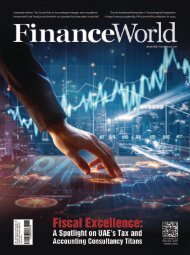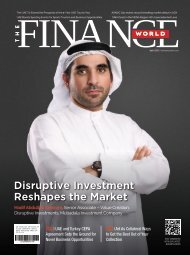Finance World Magazine| Edition: April 2024
Amidst pressing global climate challenges, the UAE has emerged as a leader in sustainability, spearheading initiatives promising a greener future. At the forefront of this movement is the country's ambitious Net Zero 2050 initiative, which has garnered pledges from several companies. This month's edition of Finance World Magazine delves into the implications of the UAE's Net Zero 2050 initiative and its transformative effects on the financial landscape, echoing the country's dedication to sustainable development. The cover story highlights companies dedicated to the Net Zero by 2050 initiative, driving change across sectors with innovative strategies for carbon neutrality, reflecting their proactive leadership and impactful contributions to a sustainable future. Between these pages, readers can discover insights into Venkat Reddy's visionary approach behind klipit, the world's first eco-friendly, blockchain-based paperless receipt app. The edition highlights the significance of the UAE's pioneering Digital Asset Law and the newly introduced Biofuel Policy, assessing their implications and potential impact. Complementing the net zero initiatives the article, “Sustainable Living in Dubai: A Closer Look at ZāZEN Properties' Prescient Developments” deciphers the successful green developments by ZāZEN Properties. It also features Shahzad Ahmad, CEO of Ensure Events, sharing insights on his entrepreneurial journey fueled by childhood passion, navigating challenges and envisioning global music festivals and business expansion. Keep yourself up to date with all financial sector news with our current news segments. Each person can find something unique from us. We believe our readers deserve real value from what we have to offer.
Amidst pressing global climate challenges, the UAE has emerged as a leader in sustainability, spearheading initiatives promising a greener future. At the forefront of this movement is the country's ambitious Net Zero 2050 initiative, which has garnered pledges from several companies. This month's edition of Finance World Magazine delves into the implications of the UAE's Net Zero 2050 initiative and its transformative effects on the financial landscape, echoing the country's dedication to sustainable development.
The cover story highlights companies dedicated to the Net Zero by 2050 initiative, driving change across sectors with innovative strategies for carbon neutrality, reflecting their proactive leadership and impactful contributions to a sustainable future. Between these pages, readers can discover insights into Venkat Reddy's visionary approach behind klipit, the world's first eco-friendly, blockchain-based paperless receipt app.
The edition highlights the significance of the UAE's pioneering Digital Asset Law and the newly introduced Biofuel Policy, assessing their implications and potential impact. Complementing the net zero initiatives the article, “Sustainable Living in Dubai: A Closer Look at ZāZEN Properties' Prescient Developments” deciphers the successful green developments by ZāZEN Properties.
It also features Shahzad Ahmad, CEO of Ensure Events, sharing insights on his entrepreneurial journey fueled by childhood passion, navigating challenges and envisioning global music festivals and business expansion.
Keep yourself up to date with all financial sector news with our current news segments. Each person can find something unique from us. We believe our readers deserve real value from what we have to offer.
You also want an ePaper? Increase the reach of your titles
YUMPU automatically turns print PDFs into web optimized ePapers that Google loves.
Digital assets, constituting a trillion-dollar<br />
asset class, present<br />
vast potential for future innovation<br />
and market opportunities. While many<br />
jurisdictions have primarily focused on<br />
regulating and enforcing sanctions related<br />
to practical applications of this asset<br />
class within regulated financial services,<br />
the fundamental benefits facilitated by<br />
blockchain technology and the diverse<br />
range of digital assets it enables are<br />
poised to expand significantly.<br />
The Digital Assets Law delineates the<br />
legal attributes of digital assets, recognising<br />
them as a form of property and providing<br />
guidelines on their control, transfer, and<br />
management by stakeholders. In conjunction<br />
with the Digital Assets Law, DIFC<br />
has introduced a complementary Law of<br />
Security, patterned after the UNCITRAL<br />
Model of Secured Transactions, and implemented<br />
corresponding amendments<br />
to existing statutes.<br />
Characteristics of Digital Assets<br />
According to the Digital Asset Law<br />
<strong>2024</strong> a Digital Asset is intangible property<br />
and is neither a thing in possession<br />
nor a thing in action. It is defined as a<br />
digital asset if:<br />
(a) it exists as a notional quantity<br />
unit manifested by the combination of<br />
the active operation of software by a<br />
network of participants and network-instantiated<br />
data;<br />
(b) it exists independently of any<br />
particular person and legal system; and<br />
(c) the thing is not capable of duplication<br />
and the use or consumption of the<br />
thing by one person or specific group of<br />
persons necessarily prejudices the use<br />
or consumption of that thing by one or<br />
more other persons.<br />
Control and Title:<br />
The Digital Asset Law specifies that<br />
an individual has control over a Digital<br />
Asset if the asset or its relevant protocol<br />
grants them exclusive abilities to prevent<br />
others from benefiting from it, to obtain<br />
substantial benefits from it, and to transfer<br />
these abilities to another person, termed<br />
as a ‘change of control’.<br />
Additionally, the individual must be<br />
able to identify themselves as possessing<br />
these abilities. A change of control<br />
encompasses various actions such as<br />
replacement, modification, destruction, or<br />
elimination of the Digital Asset, resulting<br />
in the creation of a new asset under the<br />
control of another individual.<br />
Moreover, control need not be exclusive<br />
if the Digital Asset or its protocol<br />
restricts use or the individual in control<br />
agrees to share their abilities with others.<br />
Regarding title, the law states that a<br />
person or group obtains legal ownership<br />
of a Digital Asset upon gaining control<br />
and intending to exercise control over it.<br />
In the absence of evidence suggesting<br />
otherwise, the individual or group in<br />
control is presumed to hold superior legal<br />
title. In certain agency relationships, if an<br />
agent controls a Digital Asset on behalf<br />
of a principal and intends to exercise<br />
control on the principal’s behalf, the<br />
principal holds legal title.<br />
Once the title is acquired, it remains<br />
with the individual or group until transferred<br />
or the Digital Asset is destroyed.<br />
Obligations<br />
The Digital Asset Law imposes obligations<br />
concerning the impairment of<br />
digital assets. An individual’s impairment<br />
of a digital asset is considered reckless if<br />
they are aware of the risk of impairment<br />
and unreasonably proceed to take that<br />
This legislation is<br />
groundbreaking<br />
for being<br />
the first to<br />
comprehensively<br />
define the legal<br />
attributes of<br />
digital assets in<br />
property law.”<br />
risk, especially if they know of another<br />
party’s superior interest in the asset.<br />
However, impairment is not intentional<br />
unless the individual is aware of another<br />
party’s interest and the superiority of<br />
that interest. Liability arises if an individual<br />
impairs the use of a digital asset<br />
in which another party has an interest,<br />
intentionally or recklessly causing loss<br />
to the latter.<br />
Consent from the affected party serves<br />
as a defence against impairment, as does<br />
the likelihood of reasonable consent.<br />
Co-owners may recover damages proportionate<br />
to their interest in the asset<br />
and can bring actions against fellow<br />
co-owners.<br />
Additionally, if a person is found liable<br />
to one claimant but another claimant is<br />
subsequently found to have a superior<br />
legal title to the asset, the former is<br />
accountable to the latter.<br />
Furthermore, the law grants individuals<br />
the right to recover control of a digital<br />
asset if it is under another party’s control<br />
and the latter has no legal title to the<br />
asset or has an inferior title.<br />
The law also provides the Board of<br />
Directors of the DIFCA with the authority<br />
to make regulations to further the purpose<br />
of the law or facilitate its administration,<br />
including the imposition of fines for<br />
contraventions and procedures for fine<br />
imposition and recovery.<br />
By delineating the legal attributes of<br />
digital assets and recognising them as<br />
a form of property, the law establishes<br />
clear guidelines for their management<br />
and administration.<br />
This clarity is essential in an era where<br />
digital assets play an increasingly prominent<br />
role in various aspects of commerce<br />
and finance. With this legislation, stakeholders<br />
can navigate the complexities<br />
of digital asset ownership, transfer, and<br />
control with greater confidence and legal<br />
certainty, fostering trust and facilitating<br />
the growth of digital asset markets.<br />
Moreover, by addressing legal questions<br />
surrounding digital assets, such as control<br />
and title, the law lays a solid foundation for<br />
developing strong regulatory frameworks<br />
that can adapt to the evolving landscape<br />
of digital asset innovation and usage. In<br />
an ever-evolving digital landscape, this<br />
legislation lays a foundation for clear<br />
regulations and fosters trust, crucial<br />
for the growth and innovation of digital<br />
asset markets.<br />
<strong>April</strong> <strong>2024</strong> www.thefinanceworld.com 75

















